The seven lies of the AI expert who cited himself thousands of times on scientific papers
Juan Manuel Corchado is the only candidate for the top position at the prestigious University of Salamanca in Spain despite artificially boosting his metrics to look like a world eminence
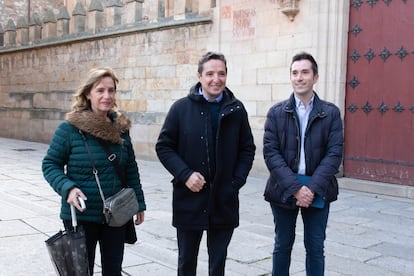
Only one person has presented his candidacy for rector of one of the oldest academic institutions in the world, the University of Salamanca. He is Professor Juan Manuel Corchado, who specializes in artificial intelligence and cybersecurity. On March 15 EL PAÍS published a story revealing that for years this academic has been enhancing his resume with tricks, publishing odd documents such as a pseudo-study on Covid with four insubstantial paragraphs and citing a hundred references to his own work. Corchado, a 52-year-old native of Salamanca, denied claims of fraud and continued on his path towards the university’s highest position, once held by the philosopher Miguel de Unamuno. On May 7, 33,000 university students are called to vote for a single candidate. If there are no surprises, the candidate will assume command of the university, with an annual budget of almost €290 million.
Corchado told seven lies in his reply to the information published by this newspaper and which he posted on his website with the title Defending the truth. The professor claimed that the documents with thousands of self-citations were simply “class exercises posted on a university website.” That’s the first lie. The reality is that Corchado used the same trick in his presentations at conferences. In a two-page abstract for a conference in Chennai, India, he cited himself 200 times. The academic knew that the Google Scholar search engine would track these documents and take them into account to develop its metrics, which is why Corchado appears to be one of the experts in artificial intelligence with the greatest impact in the world, without actually being one. Corchado has ignored new requests for information from this newspaper.
The professor maintains that he deleted the documents with self-citations when he realized that they were boosting his resume, but that is the second lie. The mass deletion began in March, just when this newspaper began to ask around. He had 45,000 citations, more than the top luminaries in the United States. And they were not class exercises published on the internet by mistake. In another superficial talk for the University of Technology Malaysia, Corchado added more than 150 self-citations and another 136 mentions of works published in the journal that he edits: Advances in Distributed Computing and Artificial Intelligence Journal (ADCAIJ). Thus he artificially multiplied his own impact and that of his magazine.
There are many more examples like these. Corchado and his assistants have for years instructed workers in his research group — called BISITE — to include in their studies a ready-made list of references to papers written by the professor or taken from ADCAIJ, according to internal emails to which this newspaper has had access. The more than 150 self-citations from the Malaysian talk are the same ones that were copied and pasted in other presentations with different titles at conferences in Spain and Portugal.
Jordi Camí, a physician who is a reference in scientific ethics in Spain, is forceful: “We expect exemplary behavior and verifiable honesty in people who aspire to occupy a position of responsibility. In view of the overwhelming data on the practices of the future rector, it is very bad news for the University of Salamanca,” says Camí, a professor at Pompeu Fabra University in Barcelona. “These ways of doing things are possible because there is impunity,” he adds.
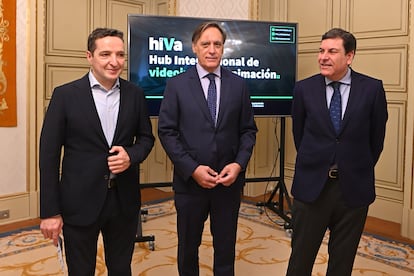
On March 18, three days after EL PAÍS published information about his practices, the candidate for rector acted as if nothing had happened, making a public appearance alongside the mayor of Salamanca, Carlos García Carbayo, and the head of economic affairs of the regional government of Castilla y León, Carlos Fernández Carriedo (both from the conservative Popular Party), to present the International Video Game and Animation Innovation Pole, a project endowed with €2.5 million in public funds for the AIR Institute, a private entity created by Corchado.
José María Díaz Mínguez, a professor of genetics at the University of Salamanca, is asking for blank votes as a sign of protest. “It is a flagrant case of academic fraud: resorting to self-citations, to massive publication, to magazines that you promote to publish your friends’ work and have them publish yours... All this is artificially boosting results due to an excessive desire to try to make people think that you are a very good scientist, not because of the quality of your discoveries, but because of manipulated figures. This man gets a huge amount of money without having to prove anything,” he warns. A year ago, the city of Salamanca handed over a €700,000 building to Corchado’s AIR Institute so it could lead a €3.5 million project to promote the digitalization of businesses in the region.
The physicist Javier Mateos, a professor of electronics at the University of Salamanca, has publicly criticized Corchado’s “shenanigans” and “cheating.” “Without those tricks he would not be among the most cited, and the Arabs would not be calling him,” he stated on his social media accounts. Corchado says on his website that he regularly travels to the United Arab Emirates and Qatar. Last November Corchado presented a €2 million project involving digital currencies in Abu Dhabi. Qatar has announced a project of almost €1 million to manage the energy consumption of buildings.
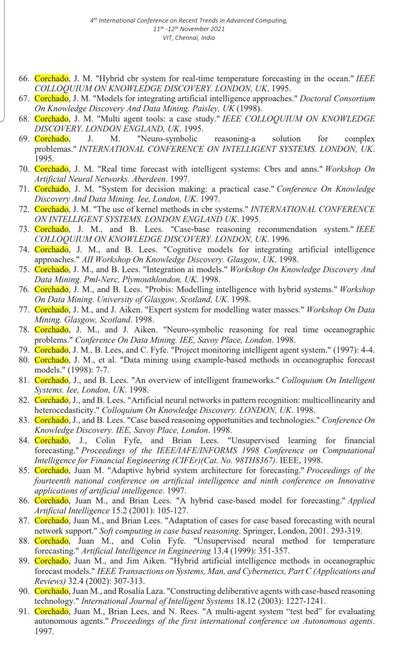
On April 23, this newspaper sent Corchado a copy of his presentation with 200 self-citations in Chennai and the one with 150 self-citations in Malaysia, requesting an interview on two occasions to hear his explanations regarding these and other practices. The academic read the messages on WhatsApp, but did not respond. When the first EL PAÍS article came out, Corchado claimed on his website that he was suffering an attack with “political intentions” to prevent him from becoming rector. That’s the third lie. The reality is that the American organization Retraction Watch, specialized in scientific fraud, had already revealed the professor’s practices in March 2022, yet Corchado maintained his behavior. The scientific journalist Dalmeet Singh Chawla, from London, showed that the professor from Salamanca copied and pasted the same string of self-citations in different conferences, even if they dealt with different topics.
In his article Defending the truth, Corchado claims that the Retraction Watch reporter did not identify himself as a journalist at the time and that is why he did not answer the questions. It is the fourth lie. The reporter tells the real story. On February 10, 2022, Chawla sent a first message to Corchado, introducing himself like this: “My name is Dalmeet Singh Chawla and I am a science reporter from the United Kingdom. I am writing an article for Retraction Watch about your Google Scholar profile, because several of your documents have quite a few references to your own work.” The reporter also asked him about a mysterious Arturo Pérez Pulido, a supposed scientist who cited Corchado thousands of times in insubstantial works published on the ResearchGate repository, another one of Google Scholar’s usual sources.
The professor maintains that he did not pay attention to the message. “Those who work with me know that I regularly receive a multitude of emails,” he says. It’s the fifth lie. Faced with the silence of the Spanish professor, Chawla insisted on February 15, 2022. Corchado then responded that he would answer the questions as soon as possible, but said that he had just broken his arm. The journalist sent him reminders on March 21 and 23 of that year, but Corchado did not reply.
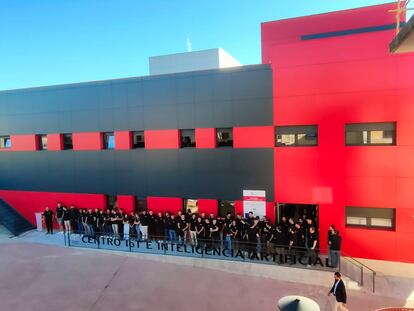
Corchado acknowledges that there were many false profiles of scientists on ResearchGate dedicated to compulsively citing his work, but assures that they were not created by him, but by a former colleague who wanted to “do harm.” This newspaper verified there are at least three apparently non-existent researchers — Juan Rodríguez, A. Pérez and Marcus Ress — whose profiles disappeared on March 13, the same day that Corchado had arranged a telephone interview with EL PAÍS. The professor stated that he and his collaborators used their knowledge in cybersecurity to delete these false profiles, since, according to their version of events, they did not have the login details as they had not been created by themselves.
A spokesperson for the scientific repository offers a different version: “We have no indication that anyone has hacked into ResearchGate. To delete an account, the account holder has to log in and delete it themselves.” That would be the sixth lie. There are still suspicious profiles of alleged researchers who only cite Corchado. A certain Denika Rout, from the University of Delhi (India), published five conference papers in 2005 with different titles, but with the same content and the same 50 citations to Corchado’s work in each of them. There are identical paragraphs that are repeated in a presentation signed by Rout, in another by Arturo Pérez Pulido, and in a chapter of a book by Corchado himself.
This newspaper has spoken with more than 40 people from the University of Salamanca and other institutions for this investigative story. Many interviewees highlighted Corchado’s moves to take the reins of the university as soon as possible. The previous rector, Ricardo Rivero, should have held the position until the end of 2025, but he resigned unexpectedly on March 7, citing “personal reasons.” The surprising thing is that Corchado was already campaigning for the post before that, even though the elections were theoretically almost two years away. On February 27, the dean of the School of Economics, Jesús Galende, had called faculty members to a meeting in which Corchado would explain “his future candidacy for rector,” as he wrote in an email message to which this newspaper has had access.
Susana Pérez Santos, a professor of applied physics, was the only one who threatened to compete against Corchado for the role, but she quit the race on March 19 after unsuccessfully requesting that the elections not be called so urgently. In a letter to faculty members, she denounced the “opacity” and the apparent “pre-established planning” of the sudden resignation of the previous rector. The political scientist Francisco Sánchez, director of the Ibero-American Institute of the University of Salamanca, also expressed astonishment. “I think the resignation of Rector Ricardo Rivero was irresponsible, because it caused an unforeseen early election that only favors one candidate who was already campaigning. We are in the midst of an institutional crisis that generates suspicions and casts doubts on the true motives of this entire process.”
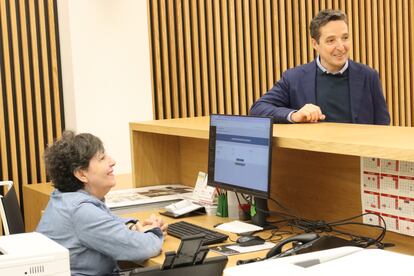
The only candidate for rector even owns a self-proclaimed “independent digital media outlet,” World Diarium, and a video platform with its own cryptocurrency, Noixion.tv, in which he does advertising for himself. Corchado insists that he does not need to cheat on Google Scholar because his metrics are also very good in other more selective databases, such as Scopus. That is the seventh lie. The reality is that his ready-made lists of self-citations have artificially boosted him everywhere, although in recent weeks he has deleted the most scandalous papers. He has also resorted to other shortcuts, such as being editor of 31 special issues of journals published by MDPI, which is owned by the Chinese chemist Shu-Kun Lin and has been criticized for easily publishing insubstantial studies in exchange for a fee of about €2,600 per paper.
MDPI’s behavior is abnormal. Around 85% of its hundreds of thousands of studies are published in so-called special issues managed by guest editors, who practically become sales agents for the magazine in exchange for being able to publish one or more articles for free. In a special issue of MDPI’s Sensors magazine, co-edited with a professor from King Abdulaziz University (Saudi Arabia), Corchado published five studies signed by himself, adding 20 self-citations. In Spanish universities there is a sarcastic way of talking about “MDPI professors,” a reference to academics who rise quickly thanks to a curriculum boosted with these tricks.
In 2019, the publisher Elsevier withdrew a study by Corchado and three collaborators for plagiarizing a master’s thesis. The professor has also been associate editor of the controversial artificial intelligence magazine IJIMAI, whose editor-in-chief is the computer engineer Rubén González Crespo, vice-rector of the International University of La Rioja (UNIR). Corchado coincided in the position with India’s Gunasekaran Manogaran, accused of setting up a megafactory of fraudulent scientific studies. A person who worked with González Crespo showed evidence that the vice-rector organized a scheme with other UNIR faculty members to boost references to the magazine IJIMAI. When they reviewed studies for other publications, they suggested to the authors that they should add references to their magazine. Both Corchado’s magazine and González Crespo’s have risen in the rankings with this type of crude trick. And both have entered the list of the most-cited scientists in the world developed by Stanford University.
The current candidate for rector and his aides also organize the annual PAAMS International Conference, with six simultaneous talks and a fee of up to €585 per attendee. It is, in addition to being a business, an easy way to fatten your resume, as Felipe Meneguzzi, chair in computing science at the University of Aberdeen (Scotland), emphasizes. “The PAAMS conference is known for being a bit predatory: anyone with a pulse would get papers accepted,” he notes.
Meneguzzi is a councillor in the Executive Council of the Washington-based Association for the Advancement of Artificial Intelligence (AAAI). “Corchado is not unique in what he does, and this is definitely not only in artificial intelligence. I reckon artificial intelligence is an easier area to disguise this because there is so much buzz and so many people working and publishing barely incremental (and very seldom, really transformative) work, that many researchers can reach profiles and citation counts that would be mind boggling to other areas. What is just unusual is that this could be done effectively to climb the hierarchy of a prestigious European University,” he emphasizes.
Computer scientist Carles Sierra directs the renowned Artificial Intelligence Research Institute in Cerdanyola del Vallès (Spain), and also chairs the European Association for Artificial Intelligence. He prefers not to comment on the specific case of Corchado, but issues a general warning: “Promoting irrelevant self-citations is a very unethical practice.” The president of the ethics committee of the University of Salamanca, Bertha Gutiérrez, is Corchado’s running mate as his future vice-rector. The timeless rector of the venerable Salamanca institution, Miguel de Unamuno, left another motto for history in 1936: “Vencer no es convencer” (To win is not to convince).
Sign up for our weekly newsletter to get more English-language news coverage from EL PAÍS USA Edition
Tu suscripción se está usando en otro dispositivo
¿Quieres añadir otro usuario a tu suscripción?
Si continúas leyendo en este dispositivo, no se podrá leer en el otro.
FlechaTu suscripción se está usando en otro dispositivo y solo puedes acceder a EL PAÍS desde un dispositivo a la vez.
Si quieres compartir tu cuenta, cambia tu suscripción a la modalidad Premium, así podrás añadir otro usuario. Cada uno accederá con su propia cuenta de email, lo que os permitirá personalizar vuestra experiencia en EL PAÍS.
¿Tienes una suscripción de empresa? Accede aquí para contratar más cuentas.
En el caso de no saber quién está usando tu cuenta, te recomendamos cambiar tu contraseña aquí.
Si decides continuar compartiendo tu cuenta, este mensaje se mostrará en tu dispositivo y en el de la otra persona que está usando tu cuenta de forma indefinida, afectando a tu experiencia de lectura. Puedes consultar aquí los términos y condiciones de la suscripción digital.









































